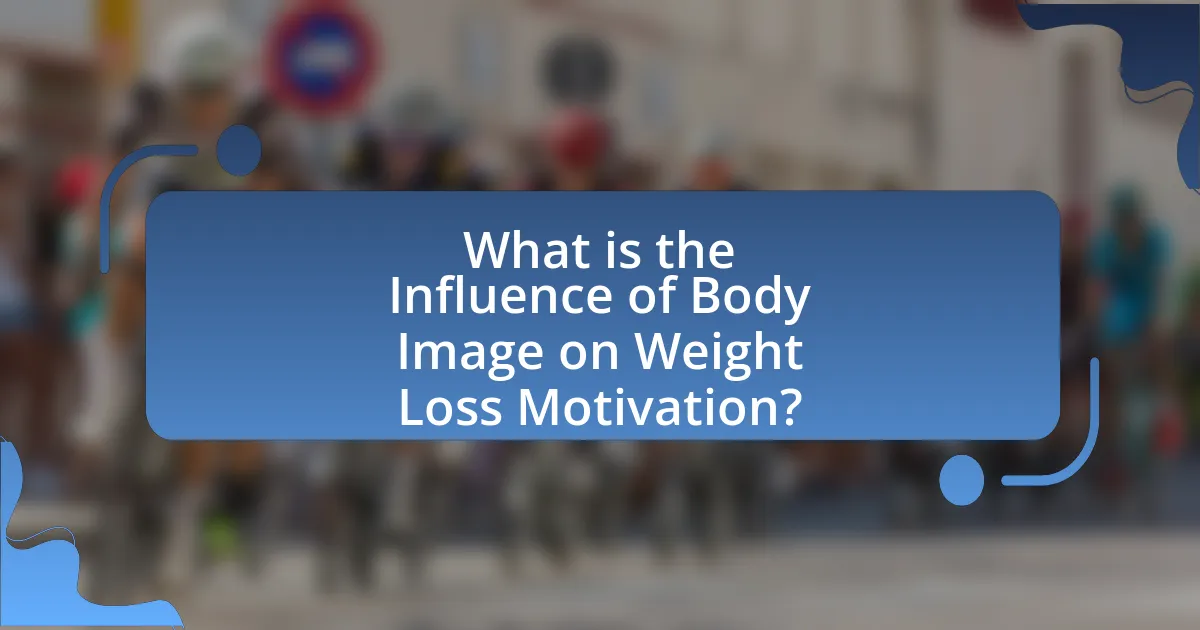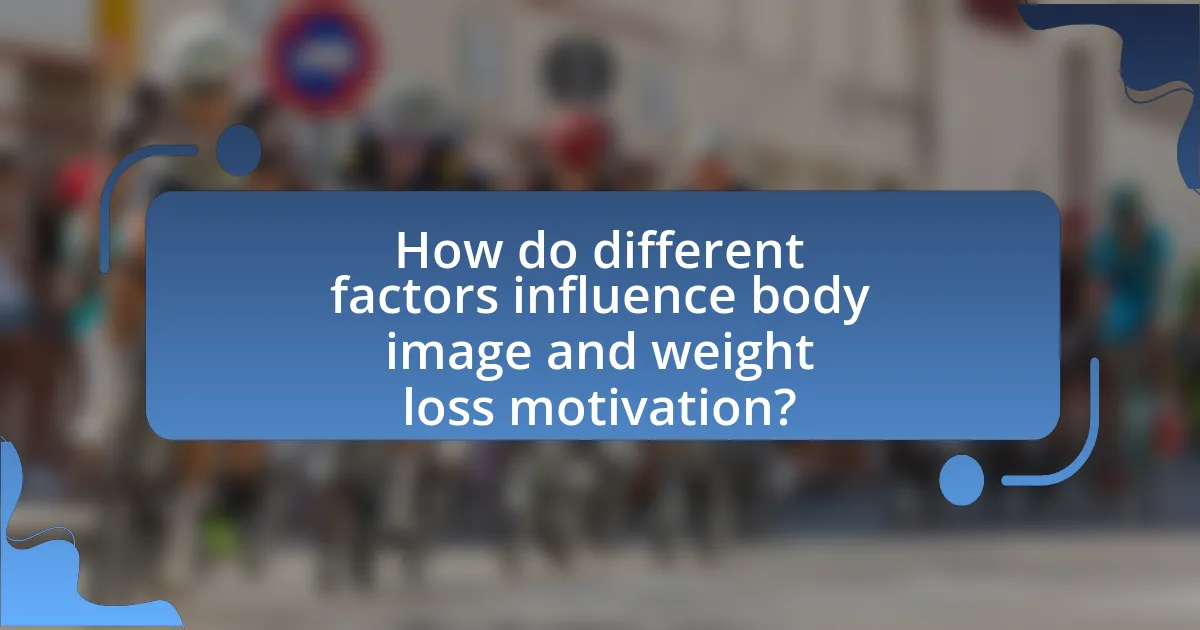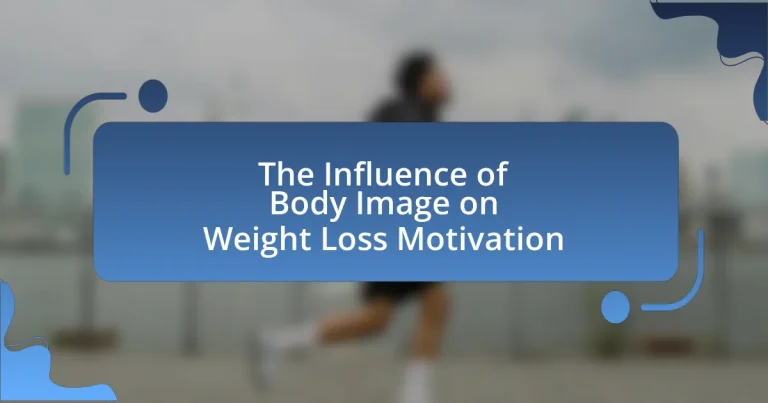The article examines the influence of body image on weight loss motivation, highlighting how self-esteem and perceived attractiveness impact individuals’ commitment to weight loss efforts. It discusses the correlation between positive body image and healthy behaviors, such as setting realistic goals and maintaining exercise regimens, while contrasting this with the detrimental effects of negative body image, which can lead to unhealthy weight loss practices and emotional distress. Additionally, the article explores psychological factors, societal pressures, and cultural differences that shape body image perceptions, as well as practical strategies for enhancing body image and motivation during weight loss journeys.

What is the Influence of Body Image on Weight Loss Motivation?
Body image significantly influences weight loss motivation by affecting individuals’ self-esteem and perceived attractiveness. Research indicates that individuals with a positive body image are more likely to engage in healthy behaviors and maintain motivation for weight loss, while those with a negative body image often experience lower motivation and may resort to unhealthy weight loss methods. A study published in the journal “Body Image” found that individuals who perceive themselves positively are more likely to set realistic weight loss goals and adhere to exercise regimens, highlighting the correlation between body image and sustained motivation for weight loss.
How does body image perception affect weight loss goals?
Body image perception significantly influences weight loss goals by shaping an individual’s motivation and self-efficacy. When individuals have a positive body image, they are more likely to set realistic and achievable weight loss goals, leading to sustained motivation and adherence to healthy behaviors. Conversely, a negative body image can result in unrealistic expectations, decreased motivation, and potential emotional distress, which may hinder progress toward weight loss objectives. Research indicates that individuals with a positive body image are more likely to engage in healthy lifestyle changes, as evidenced by a study published in the Journal of Health Psychology, which found that positive body image correlates with higher levels of physical activity and healthier eating habits.
What psychological factors contribute to body image perception?
Psychological factors that contribute to body image perception include self-esteem, societal standards, and cognitive biases. Self-esteem significantly influences how individuals perceive their bodies; higher self-esteem often correlates with a more positive body image. Societal standards, shaped by media portrayals and cultural norms, create benchmarks for attractiveness that can distort personal body image perceptions. Cognitive biases, such as the tendency to focus on perceived flaws rather than strengths, further skew body image. Research indicates that individuals exposed to idealized body images in media are more likely to experience body dissatisfaction, which can lead to negative psychological outcomes (Tiggemann & Slater, 2014, “NetGirls: The Internet, Facebook, and body image concern in adolescent girls,” International Journal of Eating Disorders).
How does societal pressure shape individual body image?
Societal pressure significantly shapes individual body image by establishing standards of beauty and attractiveness that individuals often feel compelled to meet. These societal norms are perpetuated through media representations, cultural expectations, and peer influences, leading individuals to evaluate their own bodies against these often unrealistic ideals. Research indicates that exposure to idealized body images in media can result in body dissatisfaction, which is linked to negative self-esteem and unhealthy behaviors, such as extreme dieting or exercise. For instance, a study published in the journal “Body Image” found that women who frequently consume media with thin-ideal portrayals report higher levels of body dissatisfaction and a greater desire to lose weight. This demonstrates that societal pressure not only influences how individuals perceive their bodies but also impacts their motivation for weight loss and overall health behaviors.
Why is body image important in the context of weight loss?
Body image is important in the context of weight loss because it significantly influences an individual’s motivation and commitment to their weight loss journey. A positive body image can enhance self-esteem and encourage healthier lifestyle choices, while a negative body image may lead to unhealthy behaviors, such as extreme dieting or disordered eating. Research indicates that individuals who perceive themselves positively are more likely to engage in regular physical activity and maintain a balanced diet, which are crucial for effective weight loss. For instance, a study published in the journal “Body Image” found that individuals with a positive body image reported higher levels of motivation to lose weight and were more successful in achieving their weight loss goals.
What role does self-esteem play in weight loss motivation?
Self-esteem significantly influences weight loss motivation by affecting an individual’s belief in their ability to achieve their goals. Higher self-esteem correlates with increased motivation to engage in healthy behaviors, as individuals with positive self-perceptions are more likely to set and pursue weight loss objectives. Research indicates that individuals with low self-esteem may struggle with motivation, often leading to negative self-talk and a lack of commitment to weight loss plans. A study published in the journal “Health Psychology” found that participants with higher self-esteem reported greater motivation and adherence to weight loss programs, demonstrating the critical role self-esteem plays in sustaining weight loss efforts.
How can positive body image enhance weight loss efforts?
Positive body image can enhance weight loss efforts by fostering a healthier relationship with food and exercise. Individuals who perceive their bodies positively are more likely to engage in physical activity and make nutritious food choices, as they focus on health and well-being rather than solely on appearance. Research indicates that a positive body image is associated with higher self-esteem and motivation, which can lead to sustained weight loss efforts. For instance, a study published in the journal “Body Image” found that individuals with a positive body image are more likely to adopt healthy lifestyle changes and maintain them over time, thereby improving their chances of successful weight loss.
What are the consequences of negative body image on weight loss?
Negative body image can significantly hinder weight loss efforts by leading to unhealthy behaviors and emotional distress. Individuals with a negative perception of their bodies may engage in extreme dieting or exercise regimens, which can result in physical and psychological harm, including disordered eating patterns and increased anxiety. Research indicates that negative body image is associated with lower self-esteem and motivation, making it more challenging for individuals to adhere to healthy lifestyle changes. A study published in the journal “Body Image” found that individuals with a negative body image are less likely to engage in regular physical activity and more likely to experience feelings of shame and guilt related to their weight, further complicating their weight loss journey.
How does negative body image lead to unhealthy weight loss practices?
Negative body image leads to unhealthy weight loss practices by fostering a distorted perception of self-worth and attractiveness, which can drive individuals to adopt extreme dieting or exercise regimens. Research indicates that individuals with negative body image are more likely to engage in disordered eating behaviors, such as binge eating, purging, or using diet pills, as they seek to achieve an unrealistic body ideal. A study published in the journal “Body Image” found that 70% of women reported engaging in unhealthy weight control behaviors due to dissatisfaction with their appearance. This correlation highlights how negative body image can create a cycle of harmful practices aimed at achieving perceived societal standards of beauty.
What impact does negative body image have on mental health during weight loss?
Negative body image significantly harms mental health during weight loss, often leading to increased anxiety, depression, and low self-esteem. Research indicates that individuals with a negative perception of their bodies may experience heightened emotional distress, which can undermine their motivation to lose weight and maintain healthy behaviors. A study published in the journal “Body Image” found that negative body image is associated with disordered eating patterns and a greater likelihood of developing mental health issues, such as depression and anxiety disorders. This correlation highlights the detrimental effects of negative body image on overall mental well-being during the weight loss journey.

How do different factors influence body image and weight loss motivation?
Different factors such as societal standards, personal experiences, and psychological well-being significantly influence body image and weight loss motivation. Societal standards often dictate ideal body types, leading individuals to compare themselves against these benchmarks, which can negatively impact their body image and increase motivation to lose weight. Research indicates that exposure to media portrayals of thinness correlates with body dissatisfaction and a desire for weight loss (Tiggemann & Slater, 2014). Personal experiences, including past weight loss successes or failures, also shape an individual’s motivation; positive reinforcement can enhance motivation, while negative experiences may diminish it. Furthermore, psychological factors such as self-esteem and mental health play crucial roles; individuals with higher self-esteem tend to have a more positive body image and are more motivated to pursue healthy weight loss goals. Studies show that cognitive-behavioral interventions that improve self-esteem can lead to better weight loss outcomes (Herman et al., 2016). Thus, the interplay of societal influences, personal history, and psychological health collectively shapes body image and weight loss motivation.
What role do social media and advertising play in shaping body image?
Social media and advertising significantly influence body image by promoting idealized and often unrealistic standards of beauty. These platforms frequently showcase edited and curated images that create a narrow definition of attractiveness, leading individuals to compare themselves unfavorably against these standards. Research indicates that exposure to such content can result in negative body image perceptions, increased body dissatisfaction, and a higher likelihood of engaging in unhealthy weight control behaviors. For instance, a study published in the journal “Body Image” found that individuals who frequently engage with appearance-focused social media content report lower self-esteem and greater body dissatisfaction. This demonstrates the powerful role that social media and advertising play in shaping perceptions of body image and, consequently, influencing weight loss motivation.
How does exposure to idealized body types affect self-perception?
Exposure to idealized body types negatively affects self-perception by fostering feelings of inadequacy and low self-esteem. Research indicates that individuals frequently exposed to images of idealized bodies, such as those seen in media and advertising, often compare themselves unfavorably, leading to body dissatisfaction. A study published in the journal “Body Image” by Tiggemann and Slater (2014) found that young women who viewed idealized images reported lower body satisfaction and higher levels of disordered eating behaviors. This correlation highlights how such exposure can distort self-image and contribute to unhealthy weight loss motivations.
What strategies can mitigate the negative effects of social media on body image?
To mitigate the negative effects of social media on body image, individuals can adopt strategies such as curating their social media feeds, engaging in media literacy education, and promoting positive body image messages. Curating social media feeds involves unfollowing accounts that promote unrealistic beauty standards and following those that celebrate diverse body types, which can help reduce exposure to harmful content. Media literacy education equips individuals with critical thinking skills to analyze and question the images and messages they encounter online, fostering a healthier perspective on body image. Additionally, promoting positive body image messages through personal affirmations and supportive communities can reinforce self-acceptance and counteract negative influences. Research indicates that exposure to diverse body representations can lead to improved body satisfaction and self-esteem, supporting the effectiveness of these strategies.
How do cultural differences impact body image perceptions?
Cultural differences significantly impact body image perceptions by shaping ideals of beauty and standards of attractiveness. For instance, in Western cultures, thinness is often idealized, leading to a focus on weight loss as a primary goal for body image improvement. Conversely, many non-Western cultures may celebrate fuller body types as symbols of health and wealth, resulting in different motivations for body image enhancement. Research by Swami et al. (2010) published in the journal “Body Image” indicates that cultural context influences body satisfaction and the importance placed on specific body traits, demonstrating that individuals from different cultures experience varying levels of body image dissatisfaction based on societal norms and values.
What are the varying standards of beauty across different cultures?
Varying standards of beauty across different cultures reflect diverse ideals shaped by historical, social, and environmental factors. For instance, in Western cultures, thinness is often idealized, influenced by media portrayals and fashion trends, while in some African cultures, fuller body shapes are associated with wealth and fertility, as seen in the preference for curvier figures in countries like Nigeria. In East Asian cultures, fair skin is frequently regarded as a beauty standard, linked to social status and perceived purity, as evidenced by the popularity of skin-whitening products in countries like South Korea and Japan. These cultural differences illustrate how beauty standards are not universal but rather constructed through specific societal values and norms.
How can cultural awareness improve body image and weight loss motivation?
Cultural awareness can improve body image and weight loss motivation by fostering a more inclusive understanding of diverse beauty standards and health practices. When individuals recognize and appreciate various cultural perspectives on body image, they are less likely to internalize narrow societal ideals, which can lead to a more positive self-image. Research indicates that exposure to diverse body representations can enhance self-esteem and reduce body dissatisfaction, ultimately motivating individuals to pursue healthier lifestyles. For instance, a study published in the Journal of Health Psychology found that participants who engaged with diverse body images reported higher body satisfaction and increased motivation for weight loss efforts. This highlights the importance of cultural awareness in shaping healthier attitudes towards body image and weight management.
What is the relationship between body image and physical health?
Body image significantly influences physical health, as a positive body image can lead to healthier lifestyle choices, while a negative body image often correlates with poor physical health outcomes. Research indicates that individuals with a positive perception of their bodies are more likely to engage in regular physical activity and maintain a balanced diet, which are crucial for overall health. Conversely, negative body image is associated with mental health issues such as depression and anxiety, which can lead to unhealthy behaviors like disordered eating or physical inactivity. A study published in the journal “Body Image” by Tylka and Wood-Barcalow (2015) found that positive body image is linked to better physical health indicators, including lower body mass index (BMI) and improved cardiovascular health.
How does physical fitness influence body image perception?
Physical fitness significantly enhances body image perception by improving physical appearance and boosting self-esteem. Engaging in regular exercise leads to physiological changes such as increased muscle tone and reduced body fat, which can positively alter how individuals view their bodies. Research indicates that individuals who maintain a consistent fitness routine often report higher levels of body satisfaction and self-worth. For instance, a study published in the Journal of Health Psychology found that participants who engaged in regular physical activity experienced a more positive body image compared to sedentary individuals. This correlation suggests that physical fitness not only transforms the body but also fosters a healthier mental outlook regarding one’s appearance.
What are the health implications of a distorted body image?
A distorted body image can lead to significant health implications, including mental health disorders such as depression, anxiety, and eating disorders. Research indicates that individuals with a negative body image are more likely to engage in unhealthy behaviors, such as extreme dieting or excessive exercise, which can result in physical health issues like malnutrition, cardiovascular problems, and weakened immune function. According to a study published in the Journal of Eating Disorders, approximately 30% of individuals with body image disturbances develop clinical eating disorders, highlighting the serious consequences of this issue.

What practical strategies can enhance weight loss motivation through body image improvement?
Practical strategies to enhance weight loss motivation through body image improvement include setting realistic body image goals, practicing positive self-talk, and engaging in regular physical activity. Setting realistic goals helps individuals create achievable benchmarks, which can lead to a more positive self-perception and sustained motivation. Research indicates that positive self-talk can significantly improve self-esteem and body image, thereby enhancing motivation for weight loss efforts. Additionally, engaging in regular physical activity not only aids in weight loss but also contributes to a more favorable body image, as exercise releases endorphins that improve mood and self-perception. These strategies collectively foster a healthier relationship with one’s body, which is crucial for maintaining motivation in weight loss endeavors.
How can individuals cultivate a positive body image?
Individuals can cultivate a positive body image by practicing self-acceptance and focusing on their strengths rather than perceived flaws. Engaging in positive self-talk and surrounding themselves with supportive individuals can reinforce a healthier self-perception. Research indicates that individuals who participate in regular physical activity and maintain a balanced diet report higher levels of body satisfaction, as physical health contributes to overall well-being. Additionally, studies show that media literacy, which helps individuals critically evaluate media messages about body image, can reduce the negative impact of unrealistic beauty standards.
What techniques can promote self-acceptance and body positivity?
Techniques that can promote self-acceptance and body positivity include practicing mindfulness, engaging in positive self-talk, and surrounding oneself with supportive communities. Mindfulness helps individuals become aware of their thoughts and feelings without judgment, fostering a more compassionate view of oneself. Positive self-talk involves replacing negative thoughts with affirmations that emphasize strengths and qualities beyond physical appearance. Research indicates that supportive communities, such as body positivity groups, can significantly enhance self-esteem and body image by providing validation and shared experiences. These techniques collectively contribute to a healthier relationship with one’s body and improved mental well-being.
How can mindfulness practices improve body image perception?
Mindfulness practices can improve body image perception by fostering a non-judgmental awareness of thoughts and feelings related to one’s body. This increased awareness allows individuals to recognize and challenge negative self-talk and unrealistic standards of beauty, leading to a more positive and accepting view of their bodies. Research indicates that mindfulness meditation can reduce body dissatisfaction and improve self-esteem, as shown in a study published in the journal “Body Image,” which found that participants who engaged in mindfulness practices reported lower levels of body shame and higher levels of body appreciation.
What role does support from friends and family play in body image and weight loss?
Support from friends and family significantly enhances body image and facilitates weight loss. Emotional encouragement and positive reinforcement from loved ones can boost an individual’s self-esteem, making them more likely to engage in healthy behaviors. Research indicates that social support is linked to better weight loss outcomes; for instance, a study published in the journal “Obesity” found that individuals with strong social networks lost more weight and maintained their weight loss more effectively than those without such support. This underscores the critical role that friends and family play in shaping perceptions of body image and motivating weight loss efforts.
How can social support networks enhance motivation for weight loss?
Social support networks enhance motivation for weight loss by providing emotional encouragement, accountability, and shared experiences. Individuals who engage with supportive friends, family, or groups often report increased motivation due to the positive reinforcement and encouragement they receive. Research indicates that social support can lead to better adherence to weight loss programs; for instance, a study published in the journal “Obesity” found that participants with strong social support lost more weight compared to those without it. This support can manifest through regular check-ins, shared goals, and collective activities, which foster a sense of community and belonging, further motivating individuals to pursue their weight loss objectives.
What are effective ways to communicate body image concerns with loved ones?
Effective ways to communicate body image concerns with loved ones include using “I” statements to express feelings, choosing a private and comfortable setting for the conversation, and being specific about the concerns. For instance, saying “I feel uncomfortable when I see negative comments about body image” can foster understanding without placing blame. Research indicates that open and honest communication can strengthen relationships and promote emotional support, which is crucial for addressing sensitive topics like body image. Additionally, active listening and validating the loved one’s feelings can create a safe space for dialogue, enhancing the effectiveness of the communication.
What are the best practices for maintaining motivation during weight loss journeys?
To maintain motivation during weight loss journeys, individuals should set realistic goals, track progress, and seek social support. Setting achievable goals helps create a sense of accomplishment, while tracking progress through journals or apps provides tangible evidence of success. Research indicates that social support significantly enhances motivation; a study published in the journal “Obesity” found that individuals with supportive social networks are more likely to adhere to weight loss plans. Additionally, celebrating small milestones reinforces positive behavior and keeps motivation high.
How can setting realistic goals improve weight loss motivation?
Setting realistic goals significantly enhances weight loss motivation by providing achievable benchmarks that foster a sense of accomplishment. When individuals set attainable targets, they are more likely to experience consistent progress, which reinforces their commitment to the weight loss journey. Research indicates that specific, measurable, achievable, relevant, and time-bound (SMART) goals lead to higher success rates in weight management. For instance, a study published in the Journal of Obesity found that participants who set realistic goals lost more weight and maintained their motivation over time compared to those with overly ambitious targets. This evidence underscores the importance of realistic goal-setting in sustaining motivation and promoting positive body image during weight loss efforts.
What are the benefits of celebrating non-scale victories in weight loss?
Celebrating non-scale victories in weight loss enhances motivation and reinforces positive behaviors. These victories, such as improved energy levels, better fitting clothes, or increased physical endurance, provide tangible evidence of progress beyond mere numbers on a scale. Research indicates that acknowledging these achievements can lead to greater adherence to weight loss goals, as individuals feel a sense of accomplishment and validation. A study published in the Journal of Obesity found that participants who recognized non-scale victories reported higher levels of satisfaction and motivation, which contributed to sustained weight loss efforts.


